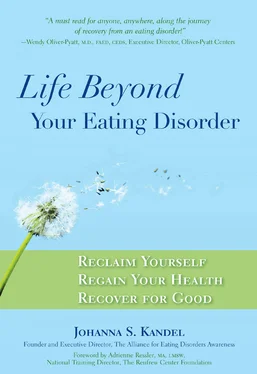We have the power to create our own version of happily-ever-after.
As you read on, you will come upon the stories of many different people from many different walks of life who have recovered from eating disorders, and you will come to see that they have followed many different paths. And just as there is no right or wrong way to recover, there is no right or wrong way to use this book. You might read it from cover to cover, or you might choose to read a few chapters and ponder them for a while. You might even decide not to begin at the beginning but to pick a chapter that looks interesting and read that first. Whatever works for you is the right way.
Lao Tzu, the sixth-century BC Chinese philosopher and father of Taoism, said, “A journey of a thousand miles begins with a single step.” Taking that first step toward recovery is really hard, and I admire you so much for taking this first step. You have come so far just by picking up this book. I know that together we can keep moving forward so that you, too, are able to create a new reality for yourself.
Dedicate yourself to the good you deserve and desire for yourself. Give yourself peace of mind. You deserve to be happy. You deserve delight.
—MARK VICTOR HANSEN, AUTHOR OF CHICKEN SOUP FOR THE SOUL
MY STORY HAS BEEN TOLD MANY TIMES. The specifics of my particular journey may be different from yours or someone else’s, but the basic story line remains the same. Since you’ve so graciously allowed me to walk beside you on your journey to recovery from your eating disorder, I think it only fair that I tell you something about my own experiences along that path. I don’t expect that your experiences will be exactly the same as mine, but I’m sure that at least some of what I describe will be familiar to you. And, really, the point is that whether or not you follow precisely in my footsteps, you, too, can and will arrive at a place where your eating disorder is no longer the first thing you think about the moment you wake up in the morning, the last thing you think about before you go to sleep and what you think about almost every moment in between. My hope is that this book will help to make your journey a bit easier as you travel your own path.
Let’s begin at the beginning. I was born and raised in West Palm Beach, Florida, but both my parents were raised in France. My father was a Holocaust survivor. When he was just four years old, his father was sent to Auschwitz. My father and his mother, my grandmother, were then separated from one another and went into hiding with different families in different places. Separated from both his parents for five years, my father missed out on much of the nurturing and early education he would otherwise have had during this critical time in his development. His father died in the concentration camp, but he and his mother were reunited after the war. Once he had completed his schooling, my father came to the United States to start a new life, returning to France once a year to visit his mother. It was on one of those visits that he met my mother, who had been born in Algeria and moved to France when she was eight years old. She was one of seven children in a family of a very poor and humble background; on many nights my maternal grandmother went to bed wondering whether she would be able to feed her children the next day.
You will arrive at a place where your eating disorder is no longer the thing you think about the moment you wake up in the morning, before you go to sleep and every moment in between.
As a result of their own upbringings, both my parents were intent on giving me every opportunity to soar in every aspect of my life, but they also had very high expectations of me. While my mother was the nurturer, very affectionate and simply wanting me to excel at whatever I did, my dad was very much the perfectionist. He expected me to become a doctor, at the very least, or perhaps even a nuclear physicist. Because I was an only child, all their hopes, dreams and expectations were invested in me. Today I understand that if they pushed me, it was because of the potential they saw in me, but at the time their expectations translated in my mind to a belief that I just wasn’t good enough to live up to the standards they—and my dad in particular—had set for me. But I tried. I always did as I was told, never gave them a hard time and put a lot of pressure on myself to do whatever I could to make them proud.
As a little girl I was extremely pigeon-toed, so my parents thought it would be a great idea to enroll me in ballet class to improve my grace and posture and help straighten out my feet. Much to their dismay, from the moment I got into that class, all I wanted was to become a ballerina. My mother continued to be supportive, but my father told me only recently that he had never expected me to become a dancer and had, in fact, been somewhat horrified by my announcement. Nevertheless, I started to dance at a local ballet academy and my training became very intense very quickly. By the time I was seven, I was already on a professional track. My parents had also enrolled me in various other classes, including gymnastics and piano, but my one true love remained ballet, and by the age of ten I was dancing four to five nights a week.
The summer before seventh grade, when I was twelve, I attended ballet camp in Chautauqua, New York, where I studied under a very well-known ballerina. I remember her saying that as dancers we needed to be “light as a feather” and the most beautiful ballerinas we could possibly be. Although she was undoubtedly talking about technique as much as weight, I immediately internalized the message that if I wanted to achieve my dream, I would have to be thin. If my dad had high expectations of me, mine for myself were even higher. Having internalized his message, it was no longer his voice but mine inside my head telling me that if I was going to do something—whatever it was—I needed to do it perfectly.
When I returned from camp at the end of the summer, I entered a new school for the performing and visual arts that had just been established. I had academic classes in the morning and dance classes in the afternoon. Then, when school was over, my mother picked me up and drove me and my friends to the dance academy of the local professional ballet company, where I was also taking classes. That fall the artistic director and the ballet mistress of the company came to our class and told us that they would be holding auditions and choosing a number of students to appear in that season’s production of The Nutcracker. They said that they were giving us this heads-up because they hoped that we’d work on our technique and also lose a bit of weight before the auditions took place. I wanted to be chosen so badly that if they’d told me to go upstairs and jump off the roof to get the part, I would have done it. But beyond simply wanting the part, I was already, even then, the quintessential people pleaser. Because of my father’s high expectations of me, as well as those I placed on myself, I simply didn’t believe, however well I did, that I was good enough. As a consequence, I believed that if I did enough to please other people, they would like me, and I also believed that if other people liked me, I would find it easier to like myself. Therefore, my incentive to lose that weight was twofold: to get the part and also to please the ballet mistress and artistic director of the company.
If I wanted to achieve my dream, I would have to be thin. If I was going to do something—whatever it was—I needed to do it perfectly.
I was still small and prepubescent. I had no idea how to lose weight, but I was determined to do it. At that time, in 1990, fat-free was all the rage, so I decided that the thing to do would be to cut as much fat as possible out of my diet. I remember telling my mother that I was going on a healthy-food diet and would be eating fruits, vegetables and lean meats. (You know, this is something I must have read somewhere—probably in one of those magazines that teach you five ways to lose weight without really trying. Certainly, as a twelve-year-old, it wasn’t anything I had come up with all by myself!) My mother, of course, thought that would be great. What parent wouldn’t be happy to hear that her child wanted to eat lots of fruits and vegetables? I bought a fat-and calorie-counter book and began to look up the content of absolutely everything I ate.
Читать дальше












